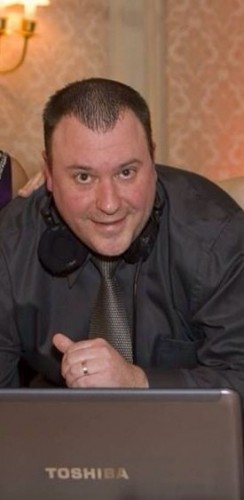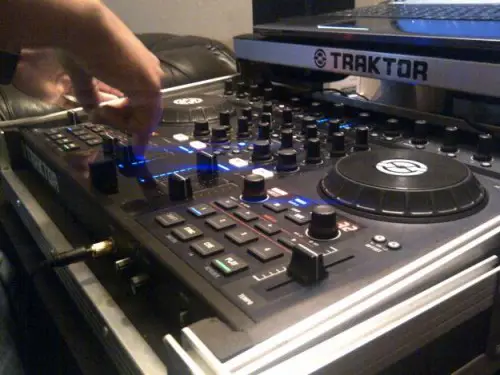Back in May we rejoiced over the celebration of Geek Week, and had plans on speaking with DJ Scarecrow out of Albany about how advancements in technology have influenced his craft. But, our schedules conflicted, and we couldn’t get together in time.
Nevertheless, we ultimately caught up with Brian Mattiske, also known as DJ Scarecrow. Scarecrow’s professional career dates back to the mid-90s, lending him a healthy perspective on how technology has changed the game from spinning turntables to pressing keyboards. Though software makes certain aspects of the trade easier for the novice, Mattiske is quick to remind you that knowledge and skill still separates the men from the boys.
Michael Hallisey: Okay. Let’s go: For starter’s, why don’t you breakdown your musical résumé for us.
Brian Mattiske: I got into “club” music when I was in high school. Besides the usual stuff, I happened to have a couple friends that were [fraternity] brothers that moved up here from Long Island. So, they introduced me to NYC club music and I was hooked. I then started DJing in my bedroom using my dad’s old turn table, a cassette deck and a SONY Discman. I had always been doing production type stuff since I was in like the 3rd grade with my dad’s dual-cassette deck and other equiptment. Mostly, I recorded stuff from the radio and edited to my own tapes. Then, when I was senior in high school, I bought another turntable. So, then I could do more legitimate mixing. I still remember the first two records that I mixed were C&C Music Factory – “Gonna Make You Sweat” and Mr. Lee – “Get Busy“. All throughout high school I used to take my allowance and go to the record store every week, so I already had a decent record collection.
MH: Then you went off to college? Did you continue on while at SUNY Oswego?
BM: Yes, throughout college I had my setup at home in the basement, so whenever I was home I just kept practicing my mixing. Then, when I was a junior in college I did my radio show with a fraternity brother on Saturday nights. We played club and hip-hop music, which I felt was appropriate for a Saturday night show. We would also have other brothers and friends come in or call in and we did sort of a goofy morning show at night. I still have a tape of outtakes of that which I NEED to get to digital. Then when I was a senior in college I started DJing some fraternity events and parties. Right out of college I got my internship with Z-Rock. We did a semi-goofy Saturday night radio show, but it was alternative and hard rock. Unfortunately, Z-Rock went out of business. Then I was kind of left doing odd jobs until I ran into my partner/supervisor from Z-Rock several months later.

MH: Z-Rock out of Albany?
BM: Yup.
MH: When did you take on the name Scarecrow?
BM: Scarecrow is my fraternity nickname. I just decided to use it as my DJ name because it suited me in a way and it was unique.
MH: How’s it suit you?
BM: Well, I was kinda tall and skinny. Much skinnier than I am now. [Laughs.] And, I was goofy. It came from the scarecrow in the Wizard of Oz. So, when I ran into my friend from Z-Rock, he asked me if I wanted to get into the mobile DJ business with him. So, I just started doing it with him. All kinds of events. But, I really loved the club DJing still. He had a few of those gigs, so I got to tag along and he’d let me spin. Eventually I started filling in for him and some other DJs. Then finally landed at the Lamp Post/Oasis with another friend where I was doing most of the spinning. There I could finally play all the NYC style club music. I did both hip-hop and club there though.
MH: Who are your mainstays, artists in particular?
BM: Well, I really go for a variety when it comes to my music. Some of the producers that are pretty consistent in my rotation are: Tiesto, Deadmau5, Sander van Doorn, Armin van Buuren. When I started mobile DJing, I was turned on to DJ remix services like X-Mix, Funkymix, and Ultimix. I still use those. They give you lead ins and outs for every track, with some additional production added, and they provide “clean” versions of hip-hop tracks in particular.
MH: I understand you’re still mixing today. With that said, that brings your timeline of experience beyond 20 years. You spoke of starting off with cassette tapes and needing to go digital with your old stuff. How has technology changed your craft? For one, there’s little “spinning” involved today.
BM: Haha, yeah now it’s my hard drive that’s “spinning”.
MH: What kind of hardware and software are you dealing with to do the job?
BM: I use a Toshiba laptop along with the Native Instruments Traktor DJ software and their S4 Controller. I keep all my music on a 1TB hard drive so that it can be portable. One of the drawbacks of using all digital are the common problems that come along with it. For example, at the end of last year my music drive died and I had to pay a lot of money to recover data I would have lost. I now subscribe to Carbonite. Can’t have that happening.
MH: You need a high-end laptop? What’s under the hood of your Toshiba?
BM: Yes, you definitely need a high-end laptop. You need a lot of RAM and a good processor. I also learned the hard way that you should never have an integrated video card. They don’t play well with the DJ software. One “problem” with digital DJing in general is that it makes it too easy for the average Joe to say they’re a DJ, when the equipment is doing the work for them. However, most music made before the turn of the century was not perfectly digitalized beats, so you do need to have some skill to mix that. What it does provide is the opportunity for artists to focus more on the production side than just on mixing. You can still scratch and do tricks if that is your thing. At first that was a problem, but now the technology has advanced to the point that it’s no longer necessary to only do that on vinyl. Plus you can now use your vinyl with the digital equipment and software. I have sold most of my vinyl because I was almost exclusively using CDs for all those years of DJing up until a couple years ago.
Now, I’m selling my CDs and will only be using music files. You can find my CD collection on E-Bay. [Laughs.]
I do still keep a few records and have a turntable for historical purposes. Also, I’d like to show my kids that. There were a few artists that I collected almost all their record singles: The Prodigy, Depeche Mode, and early De La Soul. Eventually I stopped so I never had them all, but up to a point I did. I have some De La singles that I got in Europe and cannot be bought in the US.
De La Soul – 3 Feet High & Rising is my favorite hip-hop album of all time. And I’ve never listened to an album as much as I did that one. I listened to it every day for at least 3 months. I wore out the tape, bought another, wore that out, then bought the CD.
I’ve always believed that song selection is the main key to DJing, so even with the greatest digital equipment, you aren’t necessarily a good DJ. I’ve always prided myself on getting people excited about tracks they don’t know rather than just the same stuff they’ve heard a million times.
MH: Otherwise the software is fairly user friendly?
BM: Hmmm, yes I would say it is user friendly. There is A LOT you can do with it though. So, it’s really about putting in hours of practice.
MH: How does it have an effect on your craft? Does it flatline the learning curve for novices, or does it add more tools to the trade for vets to use?
BM: I would say a little of both. Like I said, it makes it easy for someone that has never done it before to be “mixing” almost instantly. However, it does add tons of tools that experienced DJs can use and add all sorts of production aspects to their mixes, like loops, effects, samples, etc. The instant access to your full music collection is probably one of the best advantages. You don’t have to dig through record crates or CD’s. Plus it’s way more compact and portable. But it’s so great to literally type a song , artist, or anything into the search and have it instantly filter. So, if you walk up to me and request a song that I may not be familiar with or by a certain artist, but you don’t know the song, I can pull that up right away and see if I have it. Cuz you always have those people that think you are Creskin and they can walk up and say, “Hey do you have that song that goes, blah blah boom tap?” [Laughs.]
MH: Okay. Last question: where do you see things going with the influence of technology on DJing?
BM: Hmmm, that is a tough question. It’s hard to see it get even more advanced that it has, but I know it will. They keep coming out with more and more hardware that can be added to your setup to make on the fly production even easier and give more options for more creativity. I can see touch-screen technology being more integrated into it, but there’s always a certain hands-on element to DJing, so I don’t see that ever being taken away. It’s just changed as to what equipment you use and the capabilities that equipment has.
MH: Sweet. Thanks for taking the time.



Comments are closed.